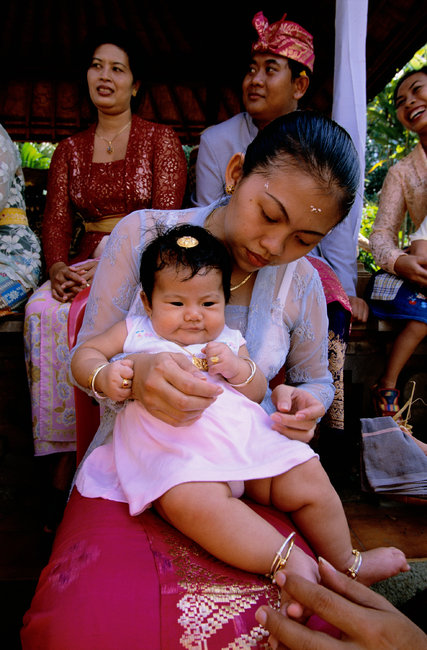From the truth-is-stranger-than-fiction department —
Talk about they way children are treated in different cultures, babies on the Indonesian island of Bali are subjected to an unusual custom — their feet should not touch the ground for their first 105 days of life. This is because belief in reincarnation is widespread and a birth is seen as the return of a deceased relative. “Before three months, babies are considered holy,” said Robert Lemelson, an anthropologist at the University of California, Los Angeles. “Their spirits still belong to the divine and are taken care of by their nyama bajang, or 108 spirits. That’s why people in Bali always try to treat babies like gods.” So infants are considered visitors from a higher plane and should be kept off the floor as a sign of respect.
This is because belief in reincarnation is widespread and a birth is seen as the return of a deceased relative. “Before three months, babies are considered holy,” said Robert Lemelson, an anthropologist at the University of California, Los Angeles. “Their spirits still belong to the divine and are taken care of by their nyama bajang, or 108 spirits. That’s why people in Bali always try to treat babies like gods.” So infants are considered visitors from a higher plane and should be kept off the floor as a sign of respect.
This custom’s origins may also have something to do with hygiene and high infant mortality rates. According to Adrian Vickers, a professor of Southeast Asian studies at the University of Sydney, “In a situation where babies often and still do die, a baby is not considered to be firmly attached to the world — its soul has not ‘stuck’ to its body — until three months. The baby’s soul is seen as liable to leave unless treated well.”
If the child does survive for 105 days — or 210 days, in some cases — an elaborate ceremony, known as nyabutan or nyambutin, is held. Upon completion of the ritual, the infant touches the ground for the first time and is officially given a name.
But what if the feet touch the ground before the ceremony? “If it happens, it is not the end of the world,” said Thomas Reuter, an anthropology professor at the University of Melbourne. “In any case, the 105-day ritual takes care of removing any negative influences the baby may have inadvertently been exposed to.”
To learn more, the source is an article at https://www.nytimes.com/2017/02/18/world/asia/bali-indonesia-babies-nyambutin.html?_r=0 . The photo came from that article.
